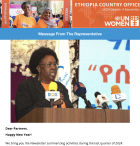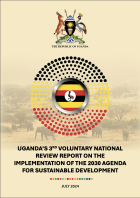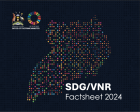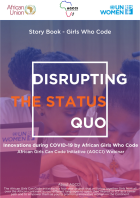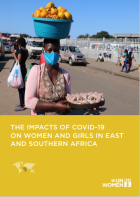1 - 12 of 12 Results
Date:
Happy New Year!
We bring you the Newsletter summarizing activities during the last quarter of 2024. As we gear towards continuing our work of empowering women and girls with a renewedspirit for 2025, we reflect on how 2024 has been for GEWE work. At UN Women EthiopiaCountry Office, we concluded the year with a vibrant commemoration of 16 Days of activism.The annual Unite Campaign brought together government entities, sister UN Agencies, CSO,Women Led organizations among others. It was yet another opportunity to collaborate andrenew commitment to work for betterment of the lives of women and girls in Ethiopia.
Date:
The United Nations Women Eastern and Southern Africa Regional Office (UN Women ESARO) was tasked with reviewing and proposing ways to enhance the integration of gender considerations in Africa’s implementation strategies for the Sendai Framework for Disaster Risk Reduction.
Date:
Following the tragic landslides in Gofa Zone (21-22 July 2024), an estimated 14,000 people are affected, including those displaced and those living in at-risk areas requiring evacuation. An emergency response has been launched by the Federal Government in partnership with local communities and humanitarian actors. Women and girls are particularly vulnerable and disproportionately affected by the crisis. They may face gender-related barriers in accessing assistance and their needs may be overlooked if gender is not mainstreamed in the response. In consultation with the national Gender in Humanitarian Action WG chairs and cochairs, the PSEA IA Coordinator, the AAP Coordinator, this document seeks to highlight actionable gender-related recommendations for humanitarian stakeholders/actors involved in the response to the landslides.
Date:
Uganda continues to make strides in implementing the Sustainable Development Goals (SDGs) within its development planning frameworks.
Date:
This factsheet provides key highlights of Uganda’s VNR and the key statistics and infographics of SDG indicators. There are 231 global SDG indicators and only 201 are applicable in the Ugandan context. This SDG fact sheet complements Uganda’s 2024 Voluntary National Review Report and provides a snapshot of the main characteristics of each of the 127 indicators on which Uganda reported.
Date:
Under the leadership of the Ministry of Gender, Child, and Social Welfare, in collaboration with the Ministry of Peace Building, and with support from UN Women and international funding, the Women’s Charter empowers women and girls to engage with the Reconstituted National Constitutional Review Commission (R-NCRC). Launched on May 29, 2024, in Juba, the Charter addresses twelve critical themes, advocating for comprehensive legal, policy, and programmatic interventions in the Permanent Constitution-making process.
Date:
This Initial Rapid Gender Assessment provides information on the different needs, capacities, and coping strategies of women, girls, boys, and men in Sudan. These needs are presented as follows: (a) Needs requiring immediate attention and, (b) Needs requiring mid-term interventions.
Date:
Drawing on an assessment of the needs of rural women in Senegal, Mali, Liberia, Malawi and Haiti, and on an ecosystem mapping and market dialogue process, these infographics illustrate the challenges that rural women face to access resilience-building services that are tailored to their needs, and provide insights into gender-responsive policy measures and innovative solutions to respond to the women’s needs and build their resilience to climate change and disasters.
Date:
Gender responsive approaches in Climate Smart Agriculture.
Date:
Innovations during COVID-19 by African Girls Who Code
Date:
The current drought response in Ethiopia is being scaled up across sectors, including food security, nutrition assistance, provision of safe water and sanitation, and livelihood protection. In addition, other urgent humanitarian assistance to drought- stricken areas such as agriculture and livestock support for pastoralist communities are also being increased. Nonetheless, the needs of women and girls may not be met due to a number of compounding factors such as the breakdown of key services which are critical to the health, protection, and recovery of women and girls; weakened informal and formal protection and accountability mechanisms; disrupted livelihoods, increased displacement, power imbalances, and limited access to resources.
Date:
This study builds on UN Women’s achievements and experience in supporting women and girls during the COVID pandemic within the East and Southern Africa Region and other parts of the world.

